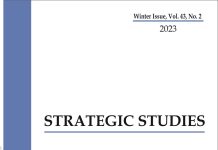Abstract
As the world is drawn increasingly into a web of shifting geopolitics, battle lines are being drawn and alliances are re-orienting themselves. Working from the premise that the competition between the United States (U.S.) and the People’s Republic of China will define the dynamics of the international system for the foreseeable future, this paper takes a look at the U.S.’s evolving posture of Integrated Deterrence and the likely Chinese response, which would have implications for Asian security. It reviews the contours of ‘Integrated Deterrence’ as it is laid out in the U.S. National Security Strategy 2022 and how this may shape the policy decisions of the U.S. and its partners, especially Taiwan, as well as how major U.S. regional allies, including India are likely to play their role in support of the U.S. interests. The paper also analyses China’s strategic thinking, national defence policy and national security objectives that are likely to influence its choices in the evolving great power competition. Taking Taiwan as the case study, the paper finds that in addition to pursuing more traditional approaches, both the U.S. and China will consider influencing domestic public opinion in China and Taiwan as a key focus of their respective policy considerations; it also finds convergences in the related responses of South Asia’s two major players, India and Pakistan.












